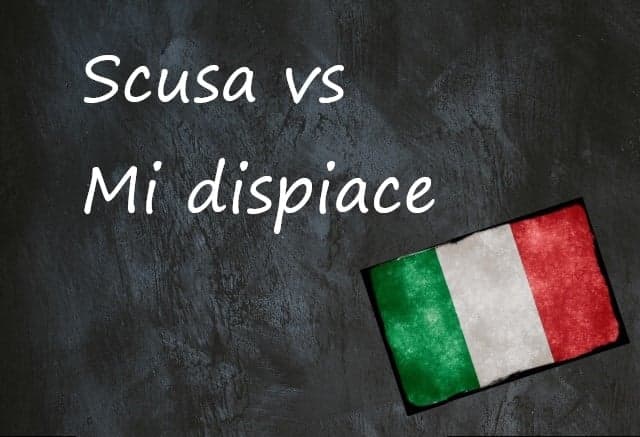Italian word of the day: Scusa vs Mi dispiace

We're sorry to say these important Italian words are easy to use incorrectly.
It's often the case in Italian that you'll find several words or phrases that mean basically the same thing, and it's not always easy to know which one is appropriate. Our new mini series looks at some of the most common word pairs, and sorts out which should be used and when.
Why do I need to know the difference between scusa and mi dispiace?
While in English a simple 'I'm sorry' cuts it in most circumstances, that's not the case when you need to apologise in Italian. Instead, different situations call for different words and expressions, and these are two of the most common.
Getting them mixed up however could make a bad situation worse.
What is the difference?
The first thing to know is that the standard way of saying a heartfelt and polite 'I’m sorry' in Italian is mi dispiace (hear the pronunciation here.)
But this expresses a level of regret that you probably wouldn't feel when, say, trying to squeeze past people on a crowded train station platform.
Instead, scusa (pronounced 'skoo-za') is the apology you'll probably hear Italian speakers use most often.
The dictionaries say it's an informal apology that's only to be used between friends and family, and for non-serious things.
If you don't understand, or if you mishear someone, the easiest thing to say is scusa? (sorry?) in an informal situation.
And when you don't understand something but need to be polite, it's scusi? (I would stick to scusi when at the local comune, for example.)
But when a proper apology is in order, mi dispiace is more suitable. You can also use this in less serious situations where you want to express at least a little regret.
See the difference in this example:
- Scusi, ma cosa significa?
- Mi dispiace, non lo capisco neanche io.
- Sorry, but what does this mean?
- I'm sorry, I don't understand it either.
Avoid scusa if you've really messed up, as in a serious situation it can come across as flippant or insincere.
Once you know this, the difference between scusa and mi dispiace seems pretty straightforward. But more confusion arises around the various conjugations of the verb scusare (to excuse) and of the reflexive form of the verb, scusarsi, meaning to excuse yourself.
See more of an explanation of these forms, plus a few other ways to apologise in Italian, here.
Do you have an Italian word you'd like us to feature? If so, please email us with your suggestion.
Don't miss any of our Italian words and expressions of the day by downloading our new app (available on Apple and Android) and then selecting the Italian Word of the Day in your Notification options via the User button.
Comments
See Also
It's often the case in Italian that you'll find several words or phrases that mean basically the same thing, and it's not always easy to know which one is appropriate. Our new mini series looks at some of the most common word pairs, and sorts out which should be used and when.
Why do I need to know the difference between scusa and mi dispiace?
While in English a simple 'I'm sorry' cuts it in most circumstances, that's not the case when you need to apologise in Italian. Instead, different situations call for different words and expressions, and these are two of the most common.
Getting them mixed up however could make a bad situation worse.
What is the difference?
The first thing to know is that the standard way of saying a heartfelt and polite 'I’m sorry' in Italian is mi dispiace (hear the pronunciation here.)
But this expresses a level of regret that you probably wouldn't feel when, say, trying to squeeze past people on a crowded train station platform.
Instead, scusa (pronounced 'skoo-za') is the apology you'll probably hear Italian speakers use most often.
The dictionaries say it's an informal apology that's only to be used between friends and family, and for non-serious things.
If you don't understand, or if you mishear someone, the easiest thing to say is scusa? (sorry?) in an informal situation.
And when you don't understand something but need to be polite, it's scusi? (I would stick to scusi when at the local comune, for example.)
But when a proper apology is in order, mi dispiace is more suitable. You can also use this in less serious situations where you want to express at least a little regret.
See the difference in this example:
- Scusi, ma cosa significa?
- Mi dispiace, non lo capisco neanche io.
- Sorry, but what does this mean?
- I'm sorry, I don't understand it either.
Avoid scusa if you've really messed up, as in a serious situation it can come across as flippant or insincere.
Once you know this, the difference between scusa and mi dispiace seems pretty straightforward. But more confusion arises around the various conjugations of the verb scusare (to excuse) and of the reflexive form of the verb, scusarsi, meaning to excuse yourself.
See more of an explanation of these forms, plus a few other ways to apologise in Italian, here.
Do you have an Italian word you'd like us to feature? If so, please email us with your suggestion.
Don't miss any of our Italian words and expressions of the day by downloading our new app (available on Apple and Android) and then selecting the Italian Word of the Day in your Notification options via the User button.

Join the conversation in our comments section below. Share your own views and experience and if you have a question or suggestion for our journalists then email us at [email protected].
Please keep comments civil, constructive and on topic – and make sure to read our terms of use before getting involved.
Please log in here to leave a comment.